Online Conversation" Young Novelist's Survival Notes: Zhang Yixuan, Hong Mingdao, and Zhong Minrui clash in the cloud
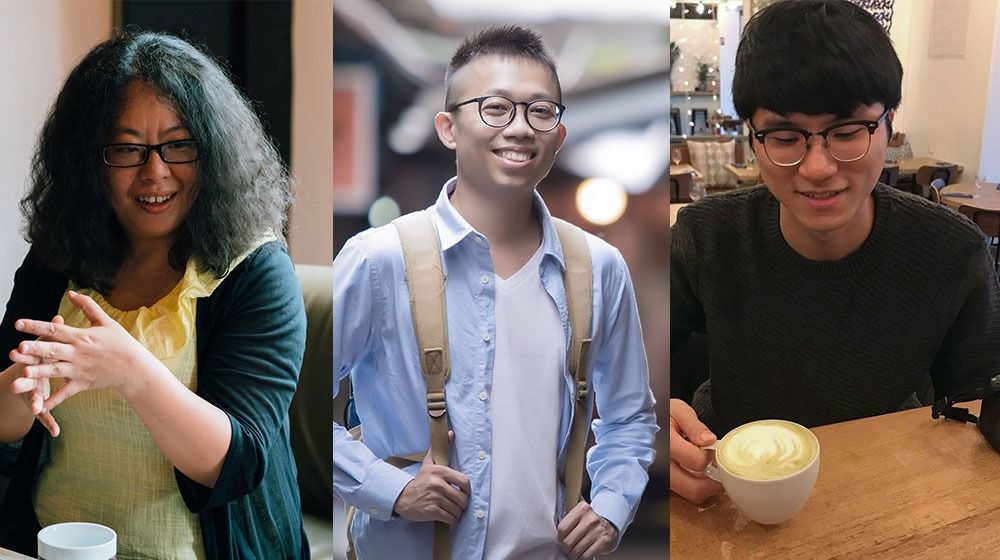
Zhang Yixuan: The two protagonists of the online conversation are my favorite young novelists, Hong Mingdao and Zhong Minrui. Before they published a collection of short stories, their writing achievements were already high-profile. So I also know their novels first, and then I meet them in person. Although many of the characters in their novels remind me of the word "boring gourd", the novelists themselves are quite talkative.
Min Rui's field of knowledge is quite extensive, I think he can participate in the competitions of ringing the bell, including movies and architecture. Ming Dao is very Taiwanese, and everyone will definitely notice that he has his own observations on Taiwanese literature and history, and even local politics. Min Rui is also a screenwriter and director, and Ming Dao is a doctor—his profile says he's "rolling through novels and medical records", but I think he should have patients too? Doctors and writers are quite traditional, as are literary and movie Amphibious. In addition to being smart and enlightened, the two are also in a not too bad creative environment, and they can look forward to the long road to literature in the future.
➤ Defense options in the novel
Zhang Yixuan: It is not easy to introduce a collection of short stories, because each short story is an independent world, so I will briefly introduce some impressionistic ideas. When I put "Waiting for the Road" and "The Right Way to Watch Shooting Stars" together, two words keep popping up in my mind, namely "sand" and "gold". Not that one is sand and the other is gold. Rather, Min Rui was very good at giving a golden atmosphere, and then slowly, a grain of sand showed a very rough texture that changed everything. Ming Dao is the opposite. At first, you will think that it is interesting or approachable sand, and then you will instantly feel that there is a grain of gold in it, so you must hold the sand well in order to retain the gold.
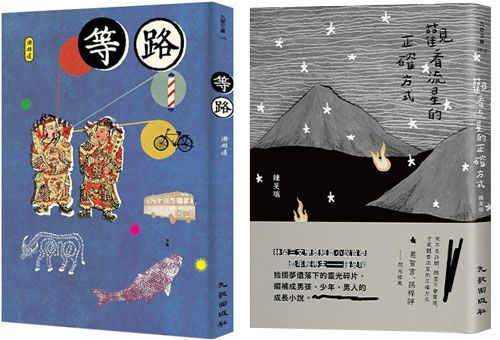
On the other hand, I see a gratifying tendency in the creations of both of them, which may be a good reference for young creators. I would call that thing "not forcing myself", but not saying no effort. Rather, it means that he is very good at choosing, and he finds a defensive range and method that he has the most affection for, and he is not greedy. The scope isn't huge, but they just "intensify" to deepen and transform them. In addition to the fact that the novel skills of the two are very stable, the novel also has an indifferent and focused temperament, which is very durable and touching.
Hong Mingdao: Thank you Yixuan and Minrui for coming together to play this online conversation. The online environment makes it easier for me to smother the characters. After smoldering for a while, I actually cooked the novel. On the one hand, I take advantage of the magic of this time, and on the other hand, I hide my clumsiness. After reading the introduction, I can't help but admire Yixuan's precision in reading the novel. In two or three sentences, I can grasp the quality of the work and my inner calculation.
I am indeed a doctor right now, and I also have patients. Clinical work is where I come into contact with a lot of different people, and it's important to stay alert. But after all, in it, there will be gains and losses.
Zhong Minrui: Last year, I took Teacher Yixuan's half-semester class at the Institute. It seems to have left you with a "beautiful" impression. When you raise your hand, you will straighten your arms and stick to your ears, haha. It is true that I have been a student who loves to speak in class since I was a child, but my eloquence is not very good, especially when I talk about my own creation, it is easy to hesitate. The few interviewers who interviewed me when the book was published should all have deep knowledge. disturbed by it.
In addition to being similar to my own personality, the character mentioned by the teacher is largely because of my novel skills, many of which were inspired by Alice Ann Munro and Raymond Carver. The "boring" in their novels, the incomprehension of various characters, and even the hidden evil intentions, brewed deep fascination for me, and I hope to create the same effect in the novels.
Also, I guess my training in scriptwriting has had an impact on my novels. When I first started writing a script, I was always warned by the school teachers not to say what I wanted to express with lines. I should try my best to let the characters use actions to convey the message. If I had to use words, I had to think carefully about the current situation and purpose of the characters. , don't let the character become a tool for explaining and filling the plot. Therefore, cutting out plots or narratives that are too straightforward has also become an instinctive reaction during self-examination.
Zhang Yixuan: When you say that, I really want to call you Miaoli.
➤The external environment of writing
Hong Mingdao: When I was just starting out, it happened to be the time when the literary policy and ecology were changing, which made me quickly find a mode that could stabilize my writing. It's really lucky. If there is no such environment to cooperate, I will still write, but maybe it will not be so smooth. When I haven't achieved anything yet and I'm not sure what I can write, I keep asking myself, if I could only write one book, which would I most want to write? The process of writing is amazing and fun, and in it, I have repeatedly affirmed that writing alone can bring me satisfaction.
Not long before I wrote "Waiting for the Road", the works I read a lot in order to educate myself affected my attitude towards novels. Watching "Pool" during that time made me feel more confident in the power of blandness. In the later "The Right Way to Watch Shooting Stars", Min Rui showed his ability to create different atmospheres and various time delays. If you take food as an example, this chef can make big dishes and snacks!
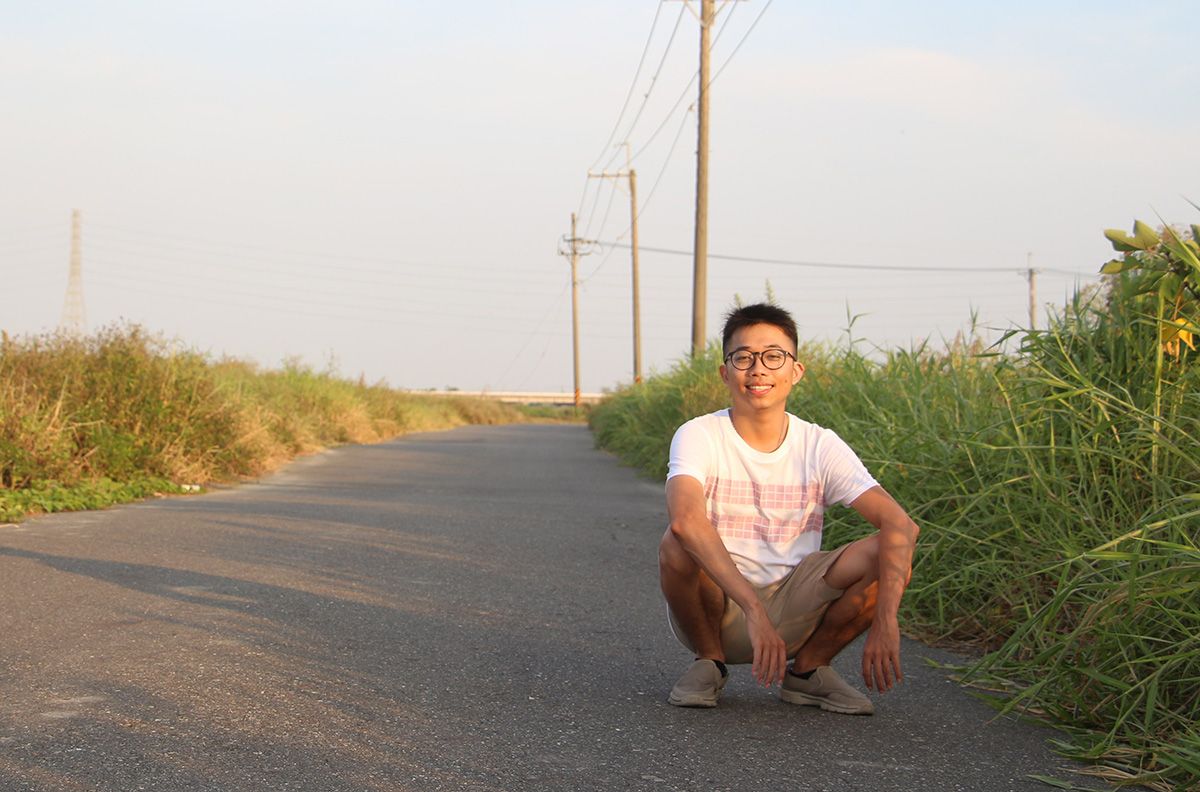
Zhong Minrui: Regarding the creative environment, the big changes that I have experienced in my impression -- or the trend, except for the online novel boom in elementary school and middle school, are the film and television IPs that everyone often talks about in recent years, but these two Those who watch TV news can learn, not some insider's observation.
The bigger anxiety is to return to the creation itself. My novels are very close to my own life, so I often have the panic of "running out of fuel". Of course, the writing has just begun, which is still a far-reaching concern, but I really often warn myself that if I don't do my homework diligently, Learn to use other materials, and worry will soon be near.
When reading Ming Dao's "Waiting for the Road", I especially admire the diversity of characters he can create. Regardless of age, he can accurately grasp the details of characters and environments. The descriptions of many passages have fully taken care of the readers' "five senses". You can hear the tone of the dialogue, smell the smell, and feel the temperature.
➤ The gay time axis in "The Right Way to Watch Shooting Stars"
Hong Mingdao: When I read "The Right Way to Watch Meteors", many chapters were about the emotions between men. When I read it, my youthful memories came to my mind. The success of the novel reminded me of some difficulties and troubles I have overcome.
In the past few years, from the partnership law to the gay marriage referendum, all gender groups have risen up, using words and mobilizing emotions to show their greatest strength. But The Right Way to Watch Shooting Stars doesn't seek representation, power, or persuasion, but rather shows the web of material, cultural, and human beings that tangle together, something that particularly appeals to me. The "that kind of thing" that is mixed with physical love, economic love, lonely love, love that projects itself, single love, flowing love... is identified in the novel.
In "The Afternoon of the Fifth Date," the novel captures moments when "this kind of thing" is both elegant and mean, neither good nor bad. But to reach such a moment, the outside is also involved, such as the visuality, immediacy of dating software, and the contingency that pulls up "me" and "he" in different social classes. The advancement of the novel is walking on the tightrope, "he" is approaching step by step, "I" is half pushed, and the final landing is not careless.
Zhang Yixuan: "The Afternoon of the Fifth Date" is well written and also the role of my sister. The life pursuit of a non-comrade sister has an obvious time and space axis, so her representative line "We are running out of time" is "her tactics". Here is a comparison of the "time and space issues" of comrades. The concerns of non-comrades are the progress on the axis of time and space. The "no" of comrades is "the absence of the axis of time and space" - the tolerance of my sister is even more cruel. Maybe comrades also want to be tolerant, but they don't have the same capital. In the novel, the harm does not come from "maliciousness", but a more fundamental situation.
It's not that difficult to find a place to live, so why choose to live with gays who don't love so much? In the past, I commented on this meeting that heterosexuals will also live together without love, and the focus is on morality. But I think the final choice is that the protagonist wants to keep the minimum comrade time and space axis, which is also the reason why some comrades make dangerous life choices. The problem is not intellectual, but more deprived of basic needs. , "We don't even have 'time to run out of time'" - the protagonist did not make this sound, which is also a very good technique, but it should be "heard" in the novel. The novel is not only sad, but also has something to say.
➤ The anxiety of running out of creative fuel
Hong Mingdao: "Meat Ball" is also one of my favorites. The subject in "Meat Ball" is not unique to gay men, and similar stories are easy to be vulgarized, but this subject is a little different when it occurs in gay men. "Meat Ball" wanders between emotional openness and possessiveness. The two characters share a room, and their interactions with the cat reveal turbulent potential messages. Even if you have thoroughly read the theory of open relationships, and have mastered books such as liquid love, the characters in the novel have to love to know the pain, and people often do.
"The Right Way to Watch Shooting Stars" often uses words to see through the composition of "that kind of thing", and the most obvious difference between "that kind of thing" and other kinds is occasionally called "gay culture", but the novel does not Deliberately emphasizing the differences, not all of them are confused, and slowly describing the "that kind of thing" that is considered good and bad by the world.
Another thing that works so well in the novel is "change". To borrow the words of the characters in the novel, "the past few years have changed too fast, and things that were once considered impossible can be dreamed again." But even so, there are growing loneliness, blues, and fears that characters who live through them often forget. "The Right Way to Watch Shooting Stars" reminds my new body of old wounds, and it also makes me dare not ignore the pain that is happening to others, potentially disrupting the linear view of progress or seeing growth as a flattening curve.
I would also like to ask Min Rui, when he was writing the first book, he had the anxiety of running out of fuel, would he want to dig deeper in the same place after writing it? How to deal with similar concerns now?
Zhong Minrui: Of course there is a feeling of wanting to go deeper, but the current plan is to shift the target and challenge other directions. On the one hand, I am interested in more things, hoping to explore the boundaries that I can master. On the one hand, I also want to put the topics I've already written about, put them underground and brew again, to see how time can change my relationship with them. This does not mean that when I write other content, I will completely abandon or reject the same elements, and probably cannot really abandon them. After all, those are the ones that touch my nerves the most, and I can't help but look at them as long as I pass by.
Whether it’s movies or novels, the taste I’ve recently developed is more “hard”, such as history or a professional, even if it’s not realistic, it’s a fantasy or science fiction work with a very meticulous worldview. When reading, I can't help but jump to the author's position to imagine how they handled the material, and while the details are complete, it doesn't become an encyclopedia, and it is still a good-looking story. These works have been very effective in relieving anxiety, and they reminded me of the importance of doing homework, and the possibilities of the work that can be developed after doing enough homework.

➤ Sensory and Narrative Exercises in Waiting for the Road
Zhang Yixuan: How does Min Rui read Ming Dao's "Waiting for the Road"? What are some of the articles that you would particularly like to bring up to discuss with you?
Zhong Minrui: When reading Ming Dao's novels, the word that comes to mind most often is "accurate". The details he picks out of various things can always reveal more information than the details themselves. For example, at the end of "Ms. Lu Zhuhong", Ms. Hong stood on the steps of the overpass, and Mingdao wrote, "The corn meal of the feed has been fermented, but it can produce the smell of meat that has been left for a long time. This smell formed the wind and blew Ms. Hong's skirt. Get up, it's a wrinkled chiffon." The so-called "five senses are taken care of" I mentioned earlier, this paragraph is a very representative example, I cheered when I read it, it's so well written .
"Crinkled Chiffon" is a minimalist line drawing, but it plays a very powerful role in the novel. Although we can piece together Miss Hong's life experience from the front, but at that moment, it seems that we can put the "material" of this character in our hands and look at it. Wrinkled, light-colored, light, granular fabrics are the choices that girls will have. . Such a material is blown by the wind with peculiar smell, whether the reader thinks about the extended meaning or not, the sensory effect it creates is very profound.
There are many sentences in Ming Dao's works, which can be taken out in this way to disassemble and read carefully. For the mastery of the characteristics of things, I feel that this is really some kind of unique talent, but maybe Mingdao has done a lot of practice before. I am not very familiar with Ming Dao's creative process before publishing the book. Could you please talk about the "practice" in novel creation, how to master these skills, choose the tone and style? Or is Waiting for the Road also some kind of conscious exercise?
Zhang Yixuan: Well, chiffon has a very comfortable and light-grained feel. I'm glad to hear the appearance of chiffon. If possible, I would also like to ask Ming Dao, how did you develop the ability to write Taiwanese? Someone told me that you are from a Taiwanese-speaking family, but some Taiwanese-speaking families may not have inherited the ability to write. I would like to know more about this part.
Hong Mingdao: In college, when I had free time, I would force myself to write some daily things, about 100 words per unit, try not to use idioms or existing sayings, but now I have no time, I have already interrupted this self-training haha!
I guess it has something to do with the method of recognizing words. In high school, I was regarded as a peer writer. She set a standard for herself in her blog or blog, that is, "don't write words that you don't understand".
Under the condition that the word must be sure, and the descriptions or sayings that have become commonplace must be avoided, in addition to the use of verbs and nouns to advance the novel, it is probably necessary to rely on various senses to perceive things. When writing "Waiting for the Road", I consciously wanted to control the communication errors at the text level, and let the meaning be generated at other levels, and a large part of the source of the search for words is the voice in life, some daily chats, On behalf of Chi. These sounds have a different dynamism from the written text, and are often Taiwanese, with a touch of elegance (ngá-khì) added to the Taiwanese part of the conversion process. That being said, it's a lot of fun for me to eavesdrop on the next table talking while I'm writing in a coffee shop.

As for tone and style, I have no active choice. I like the distance and concealment of novels very much. I like to minimize myself and keep only a certain core that I have experienced, similar to the part that touches the nerves mentioned by Min Rui.
Learning Taiwanese started from the very basic things like Roman pinyin and tones, and gradually acquired the ability to write. Until now, there is still a lot to learn. About five or six years ago, I would go to a Presbyterian class on weekends, read Taiwanese Bible stories, and double as human observations. If the writer wants to write in Taiwanese when writing, he can check the Taiwanese language online, which can avoid many traps and misdelivery. If there are special intentions or symbols, then make up your own words.
➤ Small Town Experience and White Space
Zhong Minrui: After reading "Waiting for the Road", I immediately noticed that although it is a collection of short stories that are independent of each other, there is a connection between the beginning and the end, that is, the direction of the train. The heroine of the first article "Change Zhakou" was relocated from Luzhu to Tainan because of the white terror. However, due to the unsatisfactory job transfer, she still had to get up early every day to go to Luzhu to teach. At the end of the last article "Ms. Lu Zhuhong", Miss Hong, with uncertainty, boarded the northbound train that left Lu Zhu. In fact, they are all facing Lu Zhu, revealing the contradiction that they want to leave but can't really leave.
I didn't have this kind of "closed town" experience growing up, so I wondered if this might be the reason why our works are portrayed so differently. The histories between people and places in my novels are short, even unimportant, strangers at all. The characters in Ming Dao's writings all carry a historical "umbilical cord" on their bodies, which inextricably determines the character's current appearance and situation, making it difficult for them to make real changes.
I vaguely read some kind of anger residue from Ming Dao's novel. I say residual because I think that it has been transformed by time and literary creation into an expression full of emotion, not written as a weapon, to challenge or offend anyone. For Ming Dao, what is the impact of the small town experience (both creatively and emotionally)? Could that be the source of your anger?
Hong Mingdao: I didn’t quite understand what anger was when I was growing up, and I continued to understand it through my creations. There are a lot of similar emotions hidden in the novel.
As far as the process related to creation is concerned, I was considered by my school teachers as a good composition. Literature is probably a tool for further education. That’s all. At that time, few people told me that I could explore and become whoever you want to be. I always feel like I'm not understood and stuck in school or Tainan. It sounds a little bit middle-school now, but at that time, I felt that I often collided with the external environment.
In a conservative Taiwanese-speaking family, it is difficult for the elders to imagine that their descendants will write. Occasionally, I will hear them proudly say that someone in our house has published a book and published an award, and the writing will really benefit people from other provinces. I don't mean to divide the province, and I don't think writing can be used to win or lose, but I can understand their limitations and the limitations imposed on me. In this way, instead of telling the teenage self that those angers are unnecessary, they can better understand the reality of anger and transform it into something that can be said.
I am a person from the small town, and I have stayed in Luzhu, Tainan, and Taipei for a while. You often feel physical and mental changes after moving out of place, passing through the MRT gates is not so fashionable and smooth, and your behavior patterns will also be different. The influence of the environment on me is no less than the people I encounter. The characters in "Waiting for the Road" are indeed implicated by the environment, as well as some characters, time, and other characters. All kinds of entanglements intertwined may be the historical umbilical cord that Min Rui read. According to Min Rui, the characters in "Waiting for the Road" are similar to the Japanese word for "not free", they may not be adequate, restricted or unable to move at will. But this kind of umbilical cord or way out is created by the novel, and it is left to the reader to decide whether it is persuasive or not.
Zhang Yixuan: Well, I understand! Ming Dao's words have a lot of deep meaning. "Writing to win people from other provinces" is also true. I think it is very good to say it. I'm also a writer from a small town, so I am very amazed at the "Writing Environment" skills of "Waiting for the Road". Closing small towns is a way of saying, but I see more of them dealing with "heterogeneous spaces". This is also what makes Ming Dao's novels particularly attractive. He can write "eight million kinds of immortality" in fish farms, seaside roads, or "unnamed places". I feel very strongly about the "white space" that the Metropolis has lost. The "blank thrill" of the non-urban is also the memory of the resurrection of the "land of novels". In this sense, "Waiting for the Road" can be said to be outstanding.
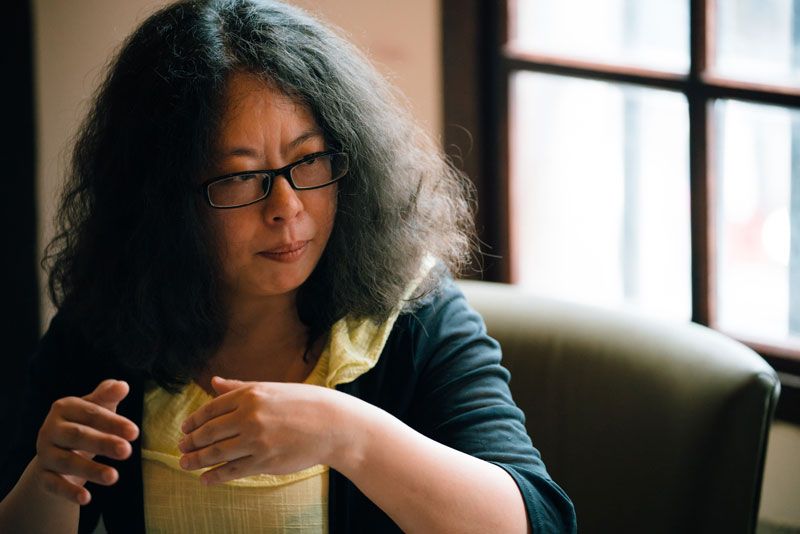
➤Fictional Body and Umbilical Cord
Zhang Yixuan: Novelists read novelists, and their focus is slightly different from that of ordinary readers. Both exhibit their own "paranoia in reading skills" (which is good). But let me balance a little bit, and also say that the story and structure of the two novels have the advantage of "not avoiding the vulgar and not vulgar", and the skills are often hidden and not obvious, and have never become a mechanism to disturb reading. In the dialogue, Ming Dao’s tendency to make comprehensive observations is more obvious. Min Rui has a special liking for the effect of a single object or sentence structure in stimulating sensibility. Above, the importance is indistinguishable. We see Min Rui Nian's "doing homework" here, and Ming Dao's efforts in developing Taiwanese writing. We will find that the two people rely heavily on engineering and process, and it seems that the positions are reversed. ——In other words, both of them have high self-demands for balanced development, and it is no accident that the novel can be written so well.
What connects the two authors together, I think, is the concept of "body equality". Because, regardless of sexual identity or multilingualism (Taiwanese is often ignored when talking about multilingualism, but I think it should be considered in multilingualism in addition to the mother tongue.), the body can be said to be the last tug-of-war point . Then, "Waiting for the Road" and "The Correct Way to Watch the Meteor" both provide a composite reflection on the concept of non-single equality of rights. The level of Mingdao's disclosure includes many articles touching on the urban and rural economy. Obstacles such as "Ms. Lu Zhuhong", " Discriminatory Correction of Pronunciation" such as "Sporadic", and the invisible body of political victims such as "Gai Zhakou" - the latter can be said to be a classic text.
And Min Rui's "Knuckles", "Fireworks" and "Containers" also point to the contemporary out-of-control fascination with images and appearances with black humor. Equality therefore becomes a highly extended field in the hands of both of them. domain and rich in content.
Finally, let me return to Min Rui's expression, and continue with Ming Dao's discussion, and expand on the "umbilical cord theory". The biological umbilical cord must be cut after it hits the ground, but what about the cultural and spiritual umbilical cord? Unlike biological, we may have a fetus and an elder, a child and an adult at the same time, so the umbilical cord may also have to be broken and unbroken. Furthermore, when we think about the umbilical cord, on which side do we orient ourselves? Is it the absorber or the supplier?
The umbilical nature of culture, which may be different from biological nature, is not absolutely one-way and mandatory. If “historicity” is often imagined as patriarchal, oppressive or conservative, in addition to restoring individual diversity to fight against, can the novel also serve as another new distribution center for roots and sources, through “de-history” and “re-history” Woolen cloth? I think this is a direction that can be further explored in the future. ●( The original text was first published on the OPENBOOK official website on 2020-06-04)
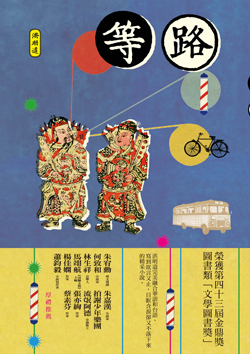
wait for the way
Author: Hong Mingdao Publishing: Jiuge Publishing
About the Author Hong Mingdao <br class="smart">Graduated from the Department of Medicine of National Taiwan University. Born in 1991, originally from Kaohsiung County. Currently working as a resident physician at Chengda Hospital, scrolling through medical records and novels. His creations are mainly novels, and his "Waiting for the Road" won the 2019 Taiwan Literature Golden Award, the Bei Bud Award, and the Golden Tripod Award. He has won the first prize for novels such as the Tainan Literature Award and the Dagou Fengyi Literature Award. I hope to be a beautiful sky lark in Taiwan's novel world.
Published several reviews in "Secret Reader" and other reviews in "United Literature" magazine.
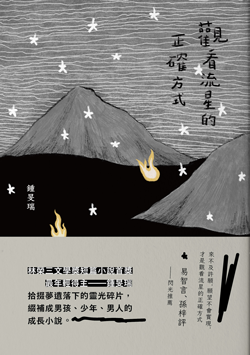
The right way to watch meteors
Author: Zhong Minrui Publishing: Jiuge Publishing
About the Author Zhong Minrui
Born in 1993, from Taipei, graduated from the Department of Radio and Television of National Chengchi University. He has won the Taipei Literature Award, the TSMC Student Youth Literature Award, and the Lin Rongsan Literature Award. The novel "Wake Up" written at the age of 17 was selected for the 100th Annual Novel Selection of Jiuge. "Swimming Pool" won the first prize of the Lin Rongsan Literary Award for short stories. He is the youngest winner in the past. He is a high-profile newcomer in the literary world. He is currently engaged in screenwriting, director and other film and television work.
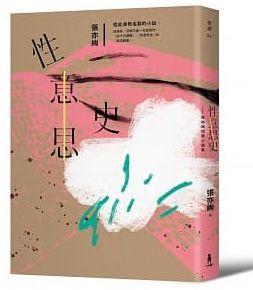
A History of Sexual Meaning: A Collection of Short Stories by Zhang Yixuan
Author: Zhang Yixuan Publishing: Trojan Culture
About the Author Zhang Yixuan
Born in Muzha, Taipei in 1973. Master's degree at the Institute of Film and Audiovisual Studies at the University of Paris III. His early works were selected in the Gay Literature Selection and Taiwan Literature Selection. In addition, he is the author of "Our Adventures Along the River" (an excellent national film screenplay), "The Grapevine", "Evening Entertainment: Inferences Don't Have to Be a Primer", and the novel "A Long Time in Love: A Memoir of Nantes/Paris" (Taipei International Book Fair) Grand Prize Finalist), The Book of Farewell: In the Age of My Absence (Taipei International Book Fair Grand Prize Finalist). Since 2019, I have written a column of "Trouble Movies" in BIOS Monthly.
Like my work? Don't forget to support and clap, let me know that you are with me on the road of creation. Keep this enthusiasm together!

- Author
- More